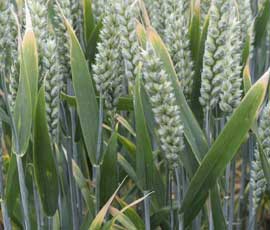Fears over resistance to wheat fungicides grows

Action must be taken to protect wheat fungicides from further resistance development an expert has warned.
Reduced Septoria tritici sensitivity to certain fungicide products has been found in research carried out in the Republic of Ireland, said John Spink, head of crop science department for Teagasc.
“The number of samples included in our research was increased last year, and for the first time included samples from Northern Ireland in conjunction with College of Agricuture, Food and Rural Enterprise,” he told the Agronomy and Business Management Conference for Cereal Growers at the College of Agriculture, Food and Rural Enterprise (CAFRE), Greenmount Campus, Antrim,.
“There has also been no significant difference between the results in Northern Ireland, when compared with those in the south. If anything there has been less insensitivity found in the north.”
In the monitoring, the curativity of single triazole fungicides has reduced, while the new SDHI fungicides have performed well.
“Gleam continues to outperform solo triazoles, and along with Adexar and Aviator, is the strongest both curatively and protectantly,” said Mr Spink. “These products are also offering the most yield response.”
|
|---|
With the rise in resistance and slight reduction in the effectiveness of some products, Mr Spink warned care must be taken in 2012 when considering fungicide programmes.
“Mixtures and programmes of different products must be used to avoid selecting resistant strains, which will extend the life of the available products.
He advised growers not to use triazole fungicides at T0 because it could accelerate the development of resistance. “Also, under no circumstances should the SDHI fungicides be used alone,” he added.
The same advice was also relevant when considering rhynchosporium treatments in barley, said Louise Cooke from the applied plant science and biometrics division for AFBI.
“Triazole efficacy in controlling rhynchosporium has been slowly eroded over many years,” she said.
Using combinations of different modes of action, including SDHI fungicides, which have good efficacy against barley diseases will reduce resistance build up, she said.
• Read more from the Agronomy and Business Management Conference for Cereal Growers.

